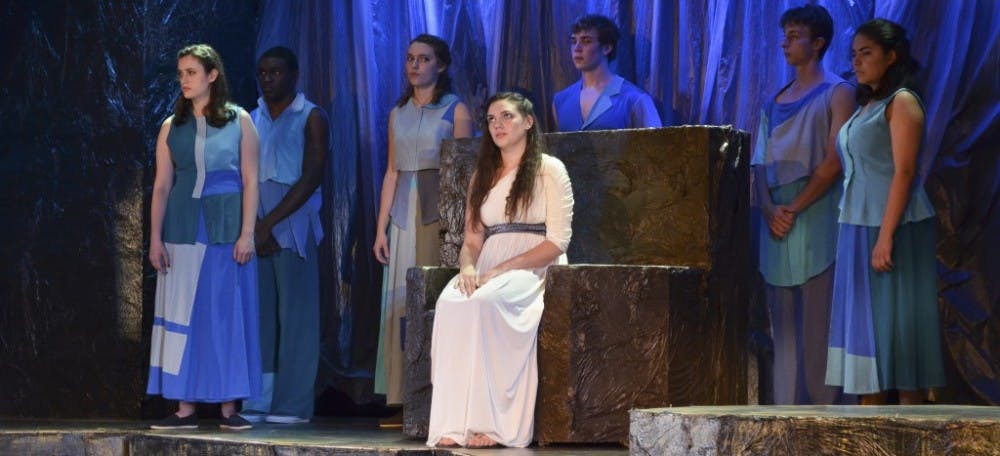Before the doors were opened, the lights in the Black Box Theatre cast an eerie blue and green light on the stage. It was opening night, and outside the theater, a huge line of students and community members waited eagerly to grab the perfect seat to watch BFA senior acting major Logan Sutton’s original play, “Story of Home.”
As audience members found their seats, a mixture of gentle tones and crashing waves filled the Black Box. The ground under the seats was painted to resemble the ocean. The theater buzzed with anticipation.
Although “The Odyssey” was written centuries ago, Sutton puts a clever, modern spin on it. The characters react to situations in familiar ways to the modern person. This helps forge a connection with the audience, especially for viewers who are unfamiliar with “The Odyssey.”
“Story of Home” has a range of characters with varying attitudes and reactions to happenings in the play. Odysseus’ absence takes a toll on all of them, causing anger, jealousy, curiosity and a pain that cannot be lifted until his return.
The heavy subject is continuous throughout the play, but there are many humorous interactions. For every serious heart-wrenching moment, there is an equally comical comment. Telemachus, Odysseus’ son, and Melantho, a servant girl, evoked many bursts of laughter and united happy sighs at the foreshadowed young love.
Sophomore Sam Jones, who plays Telemachus, embodies childhood – twitching hands, grabbing his toes when he sits and a strong desire to show off new things he’s learned. Penelope, Odysseus’ wife, played by Lauren Bambino, is optimistic about her husband’s return.
Tension increases as the first act comes to a close. The pressure becomes overwhelming and all of a sudden, it isn’t so easy to hope Odysseus will return to Ithaca.
Act II reveals a clear change. The young Telemachus has matured. He talks with a stronger tone and observes the goings-on of the adult world. Penelope has hardened over the years. The empty pit in the characters’ stomachs has deepened.
The second act is much more serious. The children in the first act have grown up and the adults have grown weary. The original playfulness has drastically decreased and the humor is darker and more mature. Innocence has almost completely vanished, with a momentous moment at the conclusion of the first act.
Neither Penelope nor Telemachus picture Odysseus as a flawless perfect figure. Pasts are dug up and Telemachus, who is not quite a man, discovers information that is not meant for his young ears.
All the effects in the play – the lights, sound, dialogue, interactions and scenery – twist together to create a well-written piece. The weeks of revisions, adjustments and rehearsals led up to an opening night that will be hard to forget.


